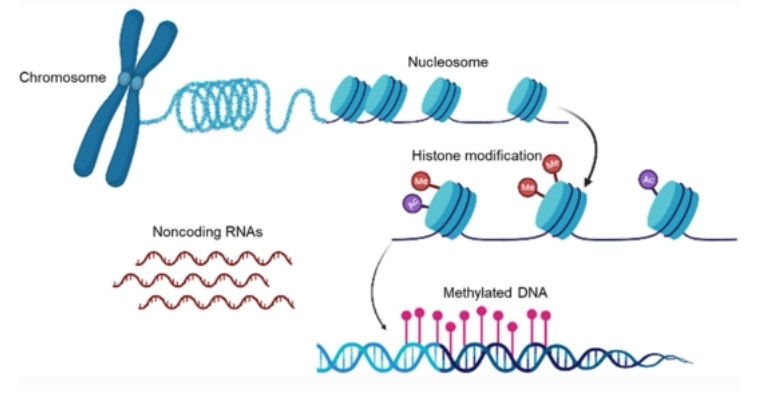The Epigenetic Edge: How Subtle Gene Tweaks Set Humans Apart
While we share a significant portion of our genetic makeup with our Neanderthal and Denisovan ancestors, modern humans possess unique qualities that set us apart. These distinctions aren't solely due to differences in DNA sequences but also arise from epigenetics, the intricate layer of regulation that modifies gene expression without altering the underlying genetic code. Epigenetics plays a crucial role in shaping our development, health, and even our evolution. In the context of human uniqueness, it offers a compelling explanation for how subtle tweaks in gene expression could have contributed to the traits that distinguish us from our hominid relatives.
Understanding Epigenetics
Imagine our DNA as a vast library of genes, each holding instructions for building and maintaining our bodies. Epigenetics acts like a librarian, controlling which books (genes) are accessible and how often they are read (expressed). This control is achieved through various mechanisms:
DNA Methylation: The addition of methyl groups to DNA can act like a "switch," turning genes on or off.
Histone Modification: Histones are proteins that DNA wraps around. Modifications to these histones can alter the accessibility of genes, influencing their expression.
Non-coding RNAs: These RNA molecules don't code for proteins but play regulatory roles in gene expression.
These epigenetic modifications are influenced by environmental factors like diet, stress, and social interactions. They can be inherited, passed down from one generation to the next, or acquired throughout life.
Epigenetic Differences and Human Uniqueness
Recent research has highlighted several key areas where epigenetic differences may have contributed to the unique traits of modern humans:
Brain Development and Cognition:
Studies have identified epigenetic differences between modern humans and Neanderthals in genes associated with brain development, particularly in regions related to language and social cognition.
These differences suggest that epigenetic modifications may have played a role in the evolution of our advanced cognitive abilities, contributing to our capacity for abstract thought, language, and complex social interactions.
2. Immune Response:
Neanderthals and Denisovans lived in different environments and faced distinct pathogens. This likely led to epigenetic adaptations in their immune systems.
Modern humans, having migrated across diverse environments, may have developed a more flexible and adaptable immune response due to epigenetic modifications.
This adaptability could explain our ability to thrive in various climates and resist a wide range of diseases.
3. Metabolic Processes:
Differences in diet and lifestyle between modern humans and our ancestors likely led to epigenetic changes affecting metabolism.
For instance, the transition to agriculture and the consumption of different foods may have induced epigenetic modifications related to carbohydrate metabolism and fat storage.
These changes could have contributed to differences in body composition, energy expenditure, and susceptibility to metabolic diseases.
4. Skeletal Development:
Although Neanderthals were robust and strong, modern humans exhibit distinct skeletal features, such as a more gracile build and a differently shaped skull.
Epigenetic modifications could have influenced the expression of genes involved in bone development, contributing to these morphological differences.
The Dynamic Nature of Epigenetics
It's important to note that epigenetics is not a static process. Our epigenome is constantly being shaped by our experiences and environment. This dynamic nature allows for rapid adaptation to changing conditions, contributing to our resilience and evolutionary success.
Future Directions
Further research into ancient DNA and comparative epigenomics will provide a deeper understanding of the role epigenetics played in human evolution. By unraveling these complex mechanisms, we can gain insights into the origins of human uniqueness and potentially develop new therapeutic strategies for diseases with epigenetic components.
In conclusion, while our shared genetic heritage with Neanderthals and Denisovans is undeniable, epigenetics adds another layer of complexity to the story of human evolution. Subtle changes in gene expression, influenced by our environment and experiences, have likely contributed to the unique traits that define us as modern humans. This understanding opens exciting new avenues for exploring the interplay between our genes, our environment, and our remarkable journey as a species.
Ref
Nobel Laureate Svante Pääbo on Epigenetics and Humans vs Neanderthals





Comments
Post a Comment